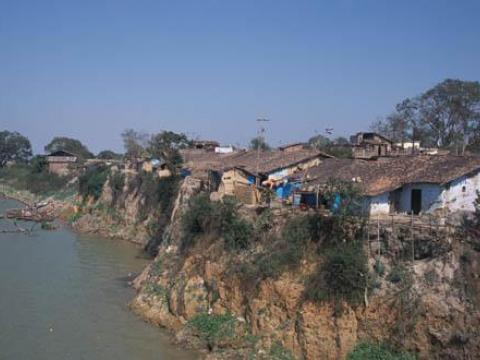India: accessing quality health care – a sea of hurdles

By: Theodore Sam, Communications; World Vision India
The emotion in Khushbu’s eyes is difficult to pinpoint.
She is married to Manoj Kumar - who is twelve years her senior. His first wife died of severe diarrhoea five years back, leaving behind two boys who are now eight and ten.
At twenty two years old, Khushbu has been married for three years now. She took on the responsibility of taking care of the boys, and will spend the rest of her young-adult years attending to them and household chores. She has never been to school.
Worry weighs on her mind.
Khushbu and Manoj carry a debt of Rs.50, 000 ($800 USD). They borrowed the money for her first child’s medical treatment.
The district of Khagaria where Khushbu and her family live lies along the banks of the River Ganges. It has very high concentrations of arsenic and iron in its groundwater - way above the maximum limit recommended by the World Health Organisation. High concentrations of arsenic and iron can cause a range of health effects from vomiting to bloody ‘rice-water’ diarrhoea to skin, lung and kidney cancer. High concentrations of iron can lead to digestive disorders, skin diseases and can have a poisoning effect on a child as it can damage blood tissues.
Wrapped in a blanket and lying in her arms is Prince, her one month old boy. Khushbu gave birth to Prince at home, because the hospital was too difficult to reach.
The nearest public health centre is around 8km from her small village. The roads are very bad and finding transport is not easy.
“We have to spend at least Rs.400 ($6) for transport to reach the nearest government public health centre,” says Manju Devi, one of Khushbu’s neighbours who lost two of her children while giving birth at home.
The government provides free ambulance services for pregnant mothers, but, ‘No matter how many times we call them, they rarely pick up the phone and respond. Even if they come, they come very late and above that they ask Rs.200 or 300 ($3 to $4) as a bribe,” says Manju Devi, frustrated.
“When we do manage to reach the health centre, it is often locked or the doctors and nurses there do not treat us properly or we are given the same set of medicines and sent away, no matter what the disease,” she adds.
Little Prince starts to cry. Khushbu immediately gathers him closer to her chest to protect him from the biting January winter.
It was around midnight when Prince was born. But he was very weak, so the next morning Khushbu and her neighbour Manju Devi went to a private health centre that’s closer.
Prince is unhealthy.
Prince weighed just 1.5 Kgs. He was diagnosed with respiratory and digestive problems. “I don’t know exactly what problem he has, but they kept him in the warmer for eight days,” said Khushbu.
The private hospitals charge exorbitant amounts of fees. “So far we have spent around Rs.50,000 ($800 USD) just on his treatment alone,” says Khushbu.
Khushbu does not know where her husband has borrowed the money from. For every Rs.100, they have to pay an interest of 5%. Khushbu, who is part of a women’s Self Help Group, saves Rs.10 every week, and has borrowed some money from the group as well, where the interest is only 2%.
Khushbu’s husband works as a daily wage labourer in New Delhi, more than 1200 km away from the village. He earns around Rs.250 ($4 to $5 USD) per day and sends home around Rs.3000 ($48) a month - most of which they have spent on Prince’s medical treatment.
It will take a long time to repay our debt.
“It will take many years before we can repay the money we have borrowed,” she says with a sense of uncertainty.
World Vision has just started an Area Development Programme (ADP) in the Khagaria District. Through the programme’s long term intervention, World Vision will provide access to clean drinking water, and will partner with the community to build-up the capacity of local health workers, will aim to empower women and children as well as increase the economic capacity of the community.
“Over the next fifteen years, we aim to change the lives of thousands of women, like Khushbu, and children through these interventions,” said Joyson, a World Vision India staff member.
Prince begins to cry again. His small, malnourished body seems unable to bear the winter cold. Khushbu covers him with the blanket and puts him to sleep, gently rocking him in her lap.